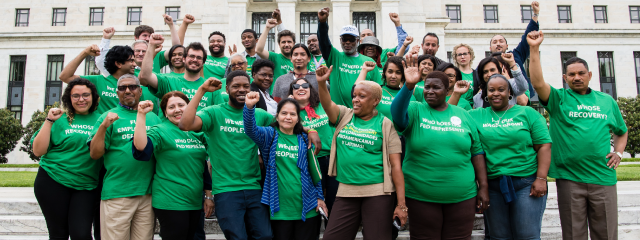Reflections on Selma and the Movement Forward

A few weeks ago, CPD staff traveled to Selma, Alabama for the 50th Anniversary of Bloody Sunday and wrote this reflection on the anniversary and the current movement moment:
Fifty years ago civil rights leaders and activists organized in Selma as part of a decades-long movement for civil and voting rights. The movement was a manifestation of the power of people when organized. It was born of years of concentrated community organizing, canvasing, action, and education—much of it executed by youth and elevated by elders. It grew in the churches, schools and streets of Montgomery, Greensboro and Birmingham. The summer before Bloody Sunday the same forces rocked electoral politics with their show of democratic determination at Freedom Summer. Months after Bloody Sunday they saw their work translate into legislation with the passage of the landmark Voting Rights Act. It was a movement made by the people and built on the premise of self-determination. The demand that black humanity be recognized—not violated. Bloody Sunday was not simply a march for the ballot box. It was a sustained movement, which sought freedom for black people and the end of economic exploitation, sub-par education, inadequate housing, unyielding state violence and capricious state power.
In reflecting on this important anniversary, we understand that we still face many challenges. There is an attempt to dismantle many of the rights won with the civil rights movement through a sustained and aggressive attack on voting rights all across the country. We also continue to fight against and suffer through state-sanctioned violence targeted at black and brown communities. The day before we arrived in Selma we learned that another unarmed black person, Tony Robinson, was killed by law enforcement in Madison, WI and on our last day in Selma we heard of the police killing of Anthony Hill in Dekalb County, GA.
While we celebrate the heroes and leaders from Selma and take lessons from their work, we remain focused on building infrastructure and power in our communities to sustain the burgeoning Movement for Black Lives. At CPD that means moving innovative and transformative voting reforms such as automatic voter registration and restoration of rights for formerly incarcerated individuals. It means investing resources and support to strengthen the infrastructure and capacity of black-led organizations rooted in black communities. It means developing policy tools and solutions that reflect the demands and voices of those organizing for criminal justice reform on the frontlines. It means supporting the growth of wrap-around community schools across the country, which holistically address the educational, physical and emotional needs of our children and prepare them for success as opposed to educational banishment and incarceration.
We look back for lessons from the past but we remain present and focused in the current movement, as we build a foundation with our partners and allies across the country for the struggles ahead.
-- Marbre Stahly-Butts & Katrina Gamble












